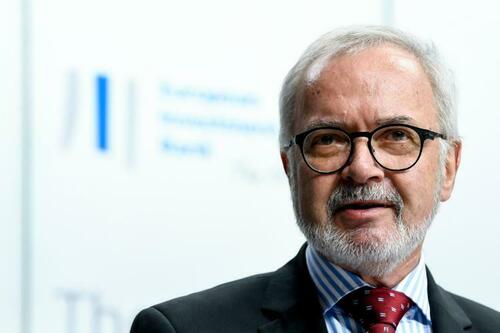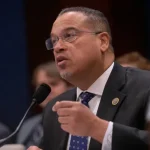
Despite the historic energy crisis rippling through the world, the European Investment Bank (EIB) isn't reconsidering green lending policies, which exclude fossil-fuel funding in Africa and other emerging countries.
EIB president Werner Hoyer said the future lies with sustainable energy sources. He said the current energy crisis caused by the sudden reduction of Russian natural gas supplies "hasn't changed our view."
"We as a European public institution should not invest in assets that one day will be seen as stranded assets," Hoyer told the Financial Times.
He said many African countries consider a so-called 'transition' from coal to NatGas, though EIB's view is much different. He added, "the energy transition must include renewables."
The direction of the EU's investment bank, the biggest multilateral bank by assets, has been very clear for several years: In 2019, begin to phase out all fossil fuel funding, including NatGas power plants, by the end of 2021. Last year, the bank chief said, "NatGas is over."
EIB's anti-fossil fuel lending restrictions have already sparked tensions with some African countries over what constitutes a "just" energy transition. Not everyone wants to travel down the route of unreliable solar and wind power sources.
Pravin Gordhan, South Africa's minister of public enterprises, called out the hypocrisy of EIB's 'green' lending policy as domestically, EU leaders scramble to restart NatGas and coal power generators after Russian energy Gazprom slashed Nord Stream 1 NatGas fuel supplies to zero last month.
"Europe, which took the hardest line in terms of emissions, is now in trouble. It is keeping coal-fired power stations going and importing coal.
"How does the EIB reconcile its views with what European governments are doing? Gordhan said.
And it gets better. European lawmakers recently approved new rules designating NatGas and nuclear as sustainable energy sources for investment purposes. That designation has infuriated leaders abroad who can't access EIB's funding for NatGas projects...
Hoyer admitted a widening gap between European and African positions on energy transition power sources. He reaffirmed EIB's financing would only be for access to clean and reliable energy in emerging markets -- nothing else.
He said many African countries had presented fossil fuel projects as "transitional," though EIB's view is that it will continue to bolster demand for fossil fuels.
Hoyer accused some countries of "hiding behind the war in Ukraine . . . because they do not seriously want to go into the energy transition and into renewables."
At the latest summit of African leaders in Rotterdam, Hoyer said he was very disappointed to see very few European representatives attend the event to discuss climate change transformation of power grids.
Felix Tshisekedi, president of the Democratic Republic of Congo, who attended the summit earlier this month, said:
"I deplore the absence of the leaders of the industrialized nations and the private sector who are, as we know, the greatest polluters."
FT noted Africa is only responsible for 2-3% of cumulative carbon emissions from energy and industry.
"On a per capita basis, Europe's electricity consumption from fossil fuel is at least 25 times Nigeria's consumption from all energy sources," Aliyu Suleiman, chief of strategy at Dangote Group, Nigeria's largest conglomerate, said.
"Pragmatically, some of this will have to come from natural gas," Suleiman added. "Denying such funding for Africa is denying Africa the opportunity to grow its economy and improve standards of living for its citizens."
It seems hypocritical that EIB's green lending policies abroad for energy projects aren't in tune with what's happening domestically.
Despite the historic energy crisis rippling through the world, the European Investment Bank (EIB) isn’t reconsidering green lending policies, which exclude fossil-fuel funding in Africa and other emerging countries.
EIB president Werner Hoyer said the future lies with sustainable energy sources. He said the current energy crisis caused by the sudden reduction of Russian natural gas supplies “hasn’t changed our view.”
“We as a European public institution should not invest in assets that one day will be seen as stranded assets,” Hoyer told the Financial Times.
He said many African countries consider a so-called ‘transition’ from coal to NatGas, though EIB’s view is much different. He added, “the energy transition must include renewables.”
The direction of the EU’s investment bank, the biggest multilateral bank by assets, has been very clear for several years: In 2019, begin to phase out all fossil fuel funding, including NatGas power plants, by the end of 2021. Last year, the bank chief said, “NatGas is over.”
EIB’s anti-fossil fuel lending restrictions have already sparked tensions with some African countries over what constitutes a “just” energy transition. Not everyone wants to travel down the route of unreliable solar and wind power sources.
Pravin Gordhan, South Africa’s minister of public enterprises, called out the hypocrisy of EIB’s ‘green’ lending policy as domestically, EU leaders scramble to restart NatGas and coal power generators after Russian energy Gazprom slashed Nord Stream 1 NatGas fuel supplies to zero last month.
“Europe, which took the hardest line in terms of emissions, is now in trouble. It is keeping coal-fired power stations going and importing coal.
“How does the EIB reconcile its views with what European governments are doing? Gordhan said.
And it gets better. European lawmakers recently approved new rules designating NatGas and nuclear as sustainable energy sources for investment purposes. That designation has infuriated leaders abroad who can’t access EIB’s funding for NatGas projects…
Hoyer admitted a widening gap between European and African positions on energy transition power sources. He reaffirmed EIB’s financing would only be for access to clean and reliable energy in emerging markets — nothing else.
He said many African countries had presented fossil fuel projects as “transitional,” though EIB’s view is that it will continue to bolster demand for fossil fuels.
Hoyer accused some countries of “hiding behind the war in Ukraine . . . because they do not seriously want to go into the energy transition and into renewables.”
At the latest summit of African leaders in Rotterdam, Hoyer said he was very disappointed to see very few European representatives attend the event to discuss climate change transformation of power grids.
Felix Tshisekedi, president of the Democratic Republic of Congo, who attended the summit earlier this month, said:
“I deplore the absence of the leaders of the industrialized nations and the private sector who are, as we know, the greatest polluters.”
FT noted Africa is only responsible for 2-3% of cumulative carbon emissions from energy and industry.
“On a per capita basis, Europe’s electricity consumption from fossil fuel is at least 25 times Nigeria’s consumption from all energy sources,” Aliyu Suleiman, chief of strategy at Dangote Group, Nigeria’s largest conglomerate, said.
“Pragmatically, some of this will have to come from natural gas,” Suleiman added. “Denying such funding for Africa is denying Africa the opportunity to grow its economy and improve standards of living for its citizens.”
It seems hypocritical that EIB’s green lending policies abroad for energy projects aren’t in tune with what’s happening domestically.






